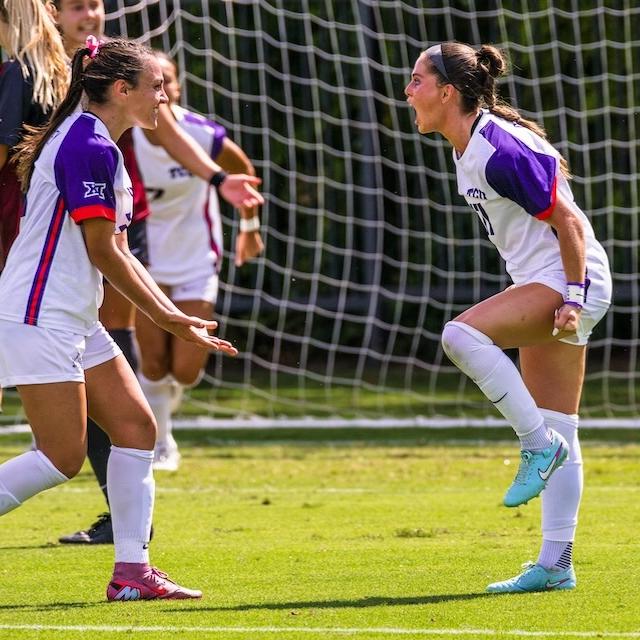
TCU Goes Global: Horned Frogs to Play in Dublin, Welcome World Cup Teams to Dallas-Fort Worth
When TCU faces North Carolina next August in the Aer Lingus College Football Classic,
it will once again take the world stage.
In what will be the 11th Division I college football game to take place on Irish soil,
the Horned Frogs and Tar Heels will clash at Aviva Stadium, a mere 362 days after
TCU handed Bill Belichick and Co. a 48-14 loss during a prime-time Labor Day game
aired on ESPN.
“TCU already has strong ties with Ireland, including an academic exchange with the
University College of Dublin, and we will be adding summer programming and internships
next summer,” Chancellor Daniel W. Pullin said. “This game is just the beginning of
exploring ways on a global stage where we can enrich academic, entrepreneurial and
cultural opportunities.”
A bowl-shaped stronghold of glass, Aviva Stadium sits just southeast of Dublin’s city
center and regularly hosts international music acts — from Metallica to Lana Del Rey
— as well as major rugby matches. It’s also home to the Republic of Ireland’s national
soccer team, which could be making a stop in Texas before TCU Football flies to the
Emerald Isle.
AT&T Stadium, just 20 miles from campus, is one of 11 U.S. venues set to host tournament
matches. The Arlington, Texas, venue will serve as the site for nine games — the most
of any venue — including a semi-final match.
In addition, across the U.S., Canada and Mexico, 49 team base-camp sites could potentially
host World Cup qualifying clubs for training and accommodations. With its world-class
facilities and prime Fort Worth location, TCU is among fewer than two dozen U.S. universities
and one of six sites in Dallas-Fort Worth preparing for that possibility.
One of those teams may be the Republic of Ireland. “The Boys in Green” started Union
of European Football Associations (UEFA) group-stage play this September with matches
against Hungary and Armenia, and later in the round, 2022 World Cup quarterfinalist
Portugal.
Game On
TCU Soccer head coach Eric Bell says his program’s pitch isn’t just good — it ranks
among the nation’s premier playing surfaces.
In 2021 and 2022, sport turf manager Andrew Siegel and his crew earned three national
Field of the Year awards from the Sports Turf Managers Association, including one
for Garvey-Rosenthal Field.
Since a major 2017 renovation, Siegel’s team has kept the pitch in peak condition
through an intricate, rotating seasonal process incorporating core aeration, irrigation,
mowing and top dressing.
“There were tons and tons and tons and tons of material excavated to make it a 100
percent flat playing surface,” Siegel said. “It is built as a USGA putting green.”
Bell calls it “the showpiece of the facility,” a feature that supports top-level competition.
Cameron Patton, the sophomore defender on this season’s nationally ranked team, agrees.
“It shows the world-class quality of what we have here,” Patton said. “From the fields
and weight rooms to the recovery spaces and support staff, everything at TCU is built
to help athletes perform at the highest level. The fact that FIFA chose us says a
lot about how special our facilities really are.”
The TCU Athletics Human Performance Center, along with renovations to 20,000 square
feet of the Bob Lilly Physical Performance Center, add more appeal. The facilities
offer a tech-heavy strength room featuring a dual-energy X-ray absorptiometry scanner,
which measures bone and muscle mass; a hyperbaric chamber; red-light therapy; and
a snow room, the first on a U.S. college campus. Combined with TCU Soccer’s sustained
success — three Big 12 regular season titles in five years — it’s easy to see why
top recruits and international soccer stakeholders are drawn to the program and campus.
The World Cup team base-camp designation, Bell said, is both an honor and a catalyst
for momentum. Hosting international teams injects energy into the program on campus
and reinforces TCU’s commitment to top-tier facilities.
“Hopefully it’s a collaborative group that’s open-minded and wants to be able to share
ideas and talk soccer,” Bell said.
The environment fuels player growth and creates opportunities to collaborate with
international partners, positioning TCU Soccer as a competitive program with global
ambitions.
“I think that what I would want them to be able to take away is, ‘Soccer is important
here,’” Bell said. “Hopefully they feel that when they’re here in the States and more
importantly in the DFW market, and hopefully they feel that from the TCU community
as well. It’s not as big as some of these European markets. But it’s growing. And
it continues to grow.”
Behind the Bid
At the heart of TCU Athletics’ push to secure a 2026 World Cup team base-camp bid
was Sassan Sahba, senior associate athletics director of facilities and event operations.
The Fort Worth Sports Commission approached his team two springs ago to ask about
TCU hosting a World Cup practice site.
“We obviously said, ‘Yes, that would be awesome.’”
After connecting FIFA’s communication team and grounds crews with TCU’s, Sahba began
leading international team representatives on tours of Garvey-Rosenthal Stadium, the
university’s soccer facilities and the Legends Club as a media space, giving visitors
a firsthand look at the resources, amenities and day-to-day operations that could
support their World Cup preparations.
“The questions will get way more technical as we get closer to teams selecting a team
base camp,” Winn Walker, director of game day operations, said. “There’s going to
be more involvement from an equipment standpoint, an athletic training and sports
medicine standpoint, and just the team operations standpoint of, ‘OK, if we select
this space, what are we going to do down to the hour?’”
Base-camp sites will be finalized and officially announced by next April.
Clubs drawn to Dallas-Fort Worth might need to plan for outdoor practices in the Texas
summer, with the tournament scheduled to run June 11 through July 19, 2026. But with
the Human Performance Center and Simpson Family Restoration Center also available
for team use, TCU can accommodate indoor and outdoor training and recovery sessions,
packed practice schedules and other operational needs.
“Excited but not surprised,” Pullin said of TCU’s selection as a World Cup team base
camp, citing the university’s No. 5 national athletics facilities ranking from The Princeton Review. “People consistently take notice of what we have to offer, and we are thrilled to
partner with the FIFA World Cup.”
Media considerations add another layer: Japan’s preliminary visit, for instance, highlighted
the possibility of as many as 200 media members to cover its team alone.
Serving as a host for Team Argentina — and thus possibly an appearance from a global
phenom in Lionel Messi — would, too, present unique logistical and security challenges.
Team Mexico could similarly draw a sizable crowd to the area, Sahaba said, given the
state’s and Dallas-Fort Worth’s Mexican-American population.
Whatever the situation, and whichever team or teams call the Fort Worth campus home
for their World Cup run, “I can tell you everyone at TCU will be more than prepared,
at every level, to accommodate,” Sahba said.
Walker counts last summer’s experience serving as a Copa America host to Chile and
Canada as valuable preparation.
“As far as the operational side,” Walker said, “understanding what it takes to provide
a top-level experience for an international soccer team, that really helped a lot.”
Global Ambition, Local Impact
Beyond the operational and logistical achievements that position TCU as a potential
World Cup host, the university views these international opportunities as propellers
of its broader strategic vision. Through partnerships with the city of Fort Worth,
international collaborators and student-focused initiatives, TCU aims to elevate its
academic, cultural and athletic presence on the global stage.
“These events expand our international reach and visibility, helping us achieve goals
across all four pillars of our new LEAD ON: Values in Action strategic plan,” Pullin
said. “They enable us to showcase our university on the global stage, which in turn
provides a gateway for us to tell our academic story and attract more students to
TCU.”
That impact extends to the home base as well: on campus and across Fort Worth.
“It’s such an incredible honor,” Patton, a recent Big 12 Player of the Week, said.
“It really puts things in perspective about how far TCU has come and the kind of standard
we hold ourselves to as athletes here.”
“The opportunity for exposure, what it means for your university, the city and the
community, it’s huge,” Ryan Peck, TCU’s senior deputy athletics director for external
affairs and revenue generation, said. “Massive.”
The 2022 World Cup final between France and Argentina drew an average live audience
of 571 million viewers — dwarfing Nielsen’s reported 127.7 million record audience
for Super Bowl LIX between the Eagles and Chiefs.
“You think about the World Cup, even when it’s in a different country, it captivates
entire communities,” Peck said. “[The Dallas Sports Commission] told me the other
day that we had 20,000 volunteers that had signed up. You think about the economic
impact that it brings to Fort Worth, the Fort Worth community, and so you’re talking
full restaurants, hotels and people spending money here.”
Pullin believes TCU is positioned to lead.
“If you want to know what the future of higher education looks like, look at TCU,”
Pullin said. “We are adaptable, nimble and innovative. We are a values-centered university
that is about transformation, not transactions. TCU is positioning itself at the intersection
of academics and the broader community to be more market-driven and, therefore, more
relevant than ever before.”
-Corey Zapata-Smith
